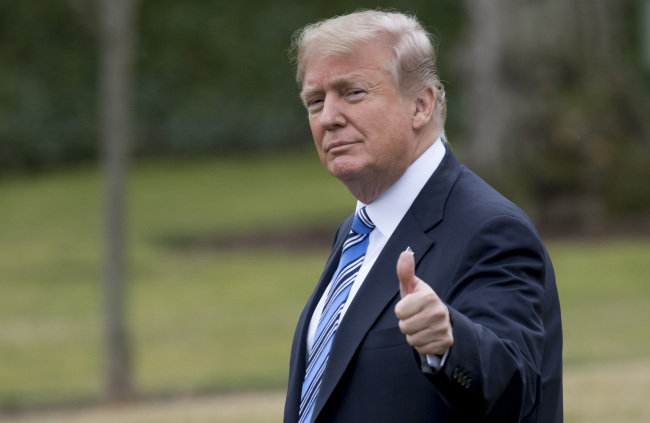US President Donald Trump has received recommendations on tariffs for steel imports, including those from South Korea, the US Department of Commerce said Friday.
The recommendations followed investigations into the impact on national security from imports of steel mill products and wrought and unwrought aluminum, the department said in a statement.
The tariffs, if adopted, would be another trade remedy undertaken by the Trump administration following its imposition of tariffs on imports of washing machines and solar cell panels made by South Korean and other companies.
 |
(AFP-Yonhap) |
"The Department of Commerce found that the quantities and circumstances of steel and aluminum imports 'threaten to impair the national security,' as defined by Section 232" of the Trade Expansion Act, the statement said, referring to reports on the investigations.
It cited, among other things, the shutdown of six basic oxygen furnaces and four electric furnaces since 2000 and a 35 percent drop in employment since 1998. China was noted as the "largest source of excess steel capacity," which in itself exceeds the total US steel-making capacity.
Commerce Secretary Wilbur Ross recommended three alternative remedies -- a global tariff of at least 24 percent on all steel imports from all countries, a tariff of at least 53 percent on all steel imports from 12 countries, including South Korea, with a quota on imports from all other countries, or a quota for all countries equal to 63 percent of their respective 2017 exports to the US.
"Each of these remedies is intended to increase domestic steel production from its present 73 percent of capacity to approximately an 80 percent operating rate, the minimum rate needed for the long-term viability of the industry, " the statement said.
The measures would be in addition to any duties currently in place.
"I am glad that we were able to provide this analysis and these recommendations to the President," Ross said in the statement. "I look forward to his decision on any potential course of action."
Trump is required to make a decision on steel by April 11 and on aluminum by April 19.
In response to the proposed import restrictions, Korean steel manufacturers expressed concerns over possible negative impacts on their sales in the major market, where they already face increasingly tougher competition with Chinese rivals.
"As the internal and external business environments are worsening, (local steel producers) are expected to face a tougher year and smaller firms will be more vulnerable to (the US tariffs)," an official from a Korean steelmaker said, asking to be unnamed. "Local companies will have to diversify sources of revenue and expand the export market with high value-added products." (Yonhap)








![[Weekender] Korea's traditional sauce culture gains global recognition](http://res.heraldm.com/phpwas/restmb_idxmake.php?idx=644&simg=/content/image/2024/11/21/20241121050153_0.jpg)